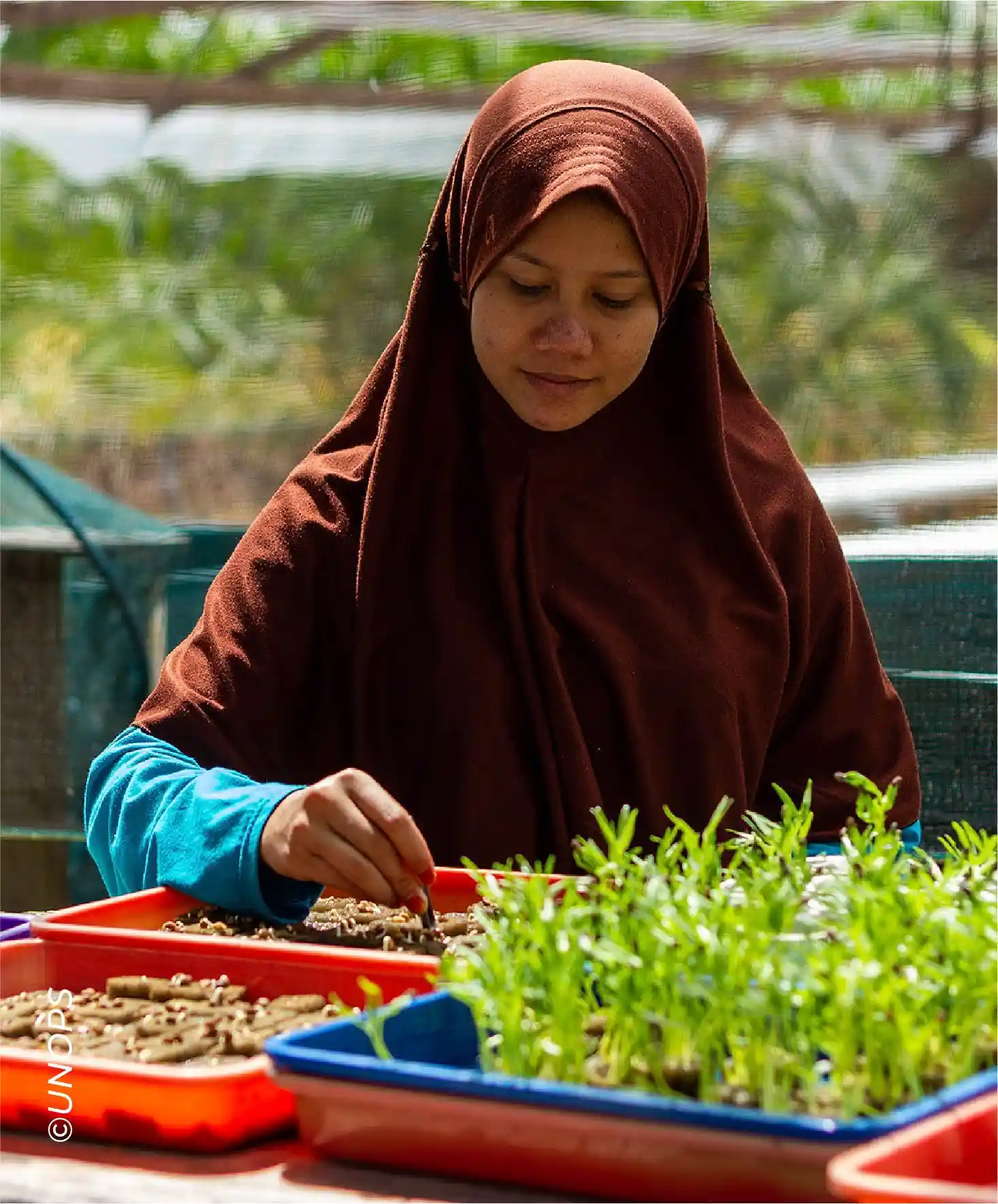United Nations In Indonesia
Country Results Report 2021
Financing Renewable Energy Development

 The blistering pace of economic development over the past decade has lifted millions of people out of poverty in Indonesia, but it has also increased demand for energy in the world’s fourth most populous country. Today, some 30 million people lack adequate access to electricity. If Indonesia is to deliver on phasing out coal-fired power stations it urgently needs more clean energy, and more efficient ways to make use of its generation mix.
The blistering pace of economic development over the past decade has lifted millions of people out of poverty in Indonesia, but it has also increased demand for energy in the world’s fourth most populous country. Today, some 30 million people lack adequate access to electricity. If Indonesia is to deliver on phasing out coal-fired power stations it urgently needs more clean energy, and more efficient ways to make use of its generation mix.
To that end, a UN project called ADLIGHT is helping Indonesia transition to more energy-efficient lighting technologies, a process that could end up saving up to 250,000 tons of CO2 eq in greenhouse gas emissions. Through ADLIGHT, the UN produced a roadmap on developing the Light-Emitting Diode (LED) industry in Indonesia, designed to help local LED producers become more competitive in the domestic market. Of 23 cities and districts scoped for interest and potential mass utilization of high-efficient LED lights, two have since signed MOUs with the Directorate of Energy Conservation, Ministry of Energy and Mineral Resources, to move ahead with baseline studies.
Another project that focuses on transforming Indonesia’s energy sector, called MTRE3, contributed to more than half a million (569,374) people living in rural areas being able to access electricity generated from renewable energy sources by the end of 2021. Under the project, the UN produced baseline studies showing the potential of renewable energy-based power generation in four pilot provinces (East Nusa Tenggara, West Sulawesi, Riau, Jambi), which helped local governments attract funds for renewable projects. For example, five new micro-hydropower plants in Jambi Province provided electricity to 916 households and public facilities that benefitted 3,534 people, almost half of whom are women. Meanwhile, a technical assistance agreement with state-owned energy company PT Sarana Multi Infrastruktur helped reduce the risk of private investment in renewable energy projects. By June 2021, the agreement had facilitated new investments in five renewable energy projects that mitigated 17,720 tCO2eq of GHG emissions through a 23,959 MWh/year energy saving. Additionally, under its Sustainable Energy Fund facility, the UN helped mobilize US$45,000 private sector financing towards the implementation of energy efficiency projects at six locations, including three airports: the international Soekarno-Hatta airport, Gedung Ravindo, and Gedung Graha Niaga in Jakarta, the International Ngurah Rai Airport in Denpasar Bali, Banyuwangi Airport in Banyuwangi, and the Cilacap refinery Unit IV in Pertamina.
Another UN-supported program will provide access to electricity to some 20,000 people living in 23 mostly island villages across East Nusa Tenggara, Southeast Sulawesi, West Sulawesi, and Central Kalimantan Provinces. Under its Accelerating Clean Energy Access to Reduce Inequality (ACCESS) program, the UN supported the Government in deploying “energy patriots” to oversee the construction of solar projects to help support some of Indonesia’s poorest and most vulnerable villages in securing equitable and sustainable access to basic services to improve their livelihoods. The project, which runs from 2020 to 2030 targets 23 villages in East Nusa Tenggara, West Sulawesi, South-East Sulawesi, and Central Kalimantan Provinces, and 25 villages in three municipalities of Timor-Leste. The energy patriots are tasked with boosting the use of clean energy resources, with the goal of improving access to healthcare, education, and economic development.
UN interventions are also helping Indonesian cities become greener. The City of Jakarta has taken steps to align its energy system with the 2030 Agenda for Sustainable Development, including setting a target for greenhouse gas emissions. In 2021, the United Nations Economic and Social Commission for Asia and the Pacific developed a sustainable energy transition roadmap to help city authorities identify policies to achieve its ambitions. The roadmap identified the need to transition to a low carbon transport system, through the gradual penetration of electric vehicles across all vehicle categories. Other recommendations include increasing non-motorized mobility to improve air quality and reduce emissions. The roadmap also suggested options to boost renewable energy use and made several recommendations on energy efficiency, including expanding the coverage of the Green Building Code and introducing Minimum Energy Performance Standards. Through these measures, the roadmap clearly demonstrated how the city’s emissions cap can be achieved by 2030. It also presented a scenario that would help the City of Jakarta develop policies to transition to being a NetZero Carbon city.